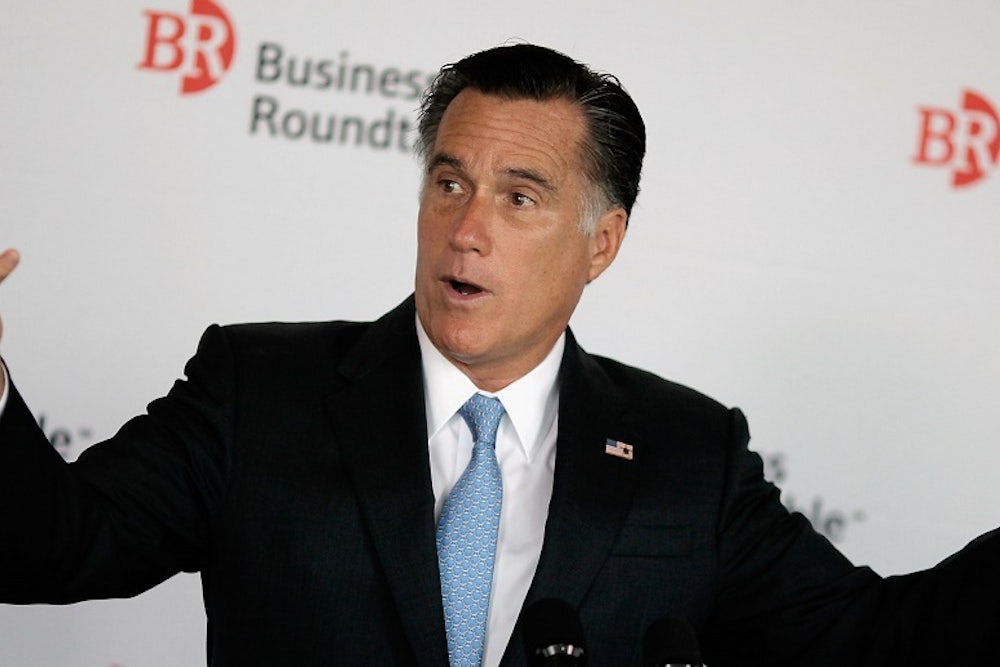Republicans like to promise things they can’t deliver, like huge tax cuts that pay for themselves or health reform plans that don’t disrupt the existing system. And that’s made life difficult for Democrats trying to propose initiatives that, in order to accomplish real goals, come with real costs. But lately Republican delusions about policy have hobbled somebody else: Members of their own party trying to show that, yes, the GOP can govern responsibly.
Just ask Dave Camp, chairman of the House Ways and Means Committee and author of a new and genuinely interesting tax reform plan. Conservatives always say they want to simplify the tax code without sticking it to the poor. And Camp’s plan would more or less do that: It would reduce the number of tax brackets, eliminate tax preferences, and expand the child tax credit. To pay for it, the plan would get rid of a bunch of loopholes, including the infamous “carried interest loophole” that allows hedge fund and private equity executives to classify their income as capital gains and pay the lower tax rate on it. It also slaps a new tax on banks and treats capital gains as normal income.
Even with those offsets, the plan is not truly revenue-neutral. After ten years, the plan would almost certainly contribute to higher deficits as revenue sources that Camp uses in the first decade disappear thereafter. Even with those one-time revenue tricks to make the deficit-increasing plan seem deficit-neutral, the plan turned off key Republican constituencies. Wall Street didn’t like the bank tax, for example, and the real estate industry didn’t like the changes to the mortgage interest deduction. Not surprisingly, House Speaker John Boehner and Senate Minority Leader Mitch McConnell dismissed it immediately. A similar plan, from Senator Mike Lee of Utah, got a friendlier reception. But that’s only because it didn’t really bother with offsets. Last week the Tax Policy Center released a score of Lee’s plan. It found that it would blow a $2.4 trillion hole in the deficit over the next 10 years.
The problem for Camp and Lee isn’t so much what they’re proposing. The problem is what their colleagues and their supporters have come to expect. Republicans have a long history of making unrealistic economic proposals, going back to the days when George H.W. Bush, running for president in 1980, dismissed Ronald Reagan’s agenda as “voodoo economics.” But things have gotten worse and, during the 2012 presidential campaign, they may have hit an all-time low.
First, there was Herman Cain and his “9-9-9 plan,” which proposed to eliminate all income, payroll, capital gains and corporate profit taxes and replace them with a nine percent tax on income, a nine percent tax on businesses and a nine percent national sales tax. Then Mitt Romney, the eventual nominee, produced his own tax plan. Romney, an accomplished businessman and governor once famous for his pragmatic management style, wooed conservative voters with an outlandish set of promises: He would lower all rates by 20 percent, repeal the estate tax and make up the revenue by closing unspecified tax preferences. He also wanted to lower the corporate tax rate from 35 percent to 28 percent, repeal the Alternative Minimum Tax and eliminate the Affordable Care Act surtaxes. Romney vowed that the plan would be revenue neutral, because he’d close unspecified tax loopholes, but the Tax Policy Center concluded it would take nearly $500 billion worth of loopholes just to make it revenue neutral in 2015 alone. To put that in perspective, the Congressional Budget Office projects defense spending will be $600 billion in 2014.
These kinds of expectations haven’t just hobbled the Republican Party’s would-be tax reformers—they have hobbled its would-be health care reformers, as well. Last month, senators Richard Burr, Tom Coburn and Orrin Hatch put forward the “Patient CARE Act”—which, the sponsors promised, would make insurance more widely available without the constraints and cost of Obamacare. The plan would allow people to buy cheaper, less comprehensive plans that offer less financial protection than those sold on the ACA’s exchanges. It would also require less government spending.
But the plan actually has a lot in common with Obamacare. It would, for example, offer means-tested tax credits to low-income Americans to purchase insurance. And it would pay for those credits by capping the tax exclusion for employer-sponsored plans.
Of course, partly as a result of such changes, it would also disrupt a lot of existing insurance arrangements. It would also shift many people into plans with “narrow networks”—that is, relatively limited groups of doctors and hospitals. Republicans have spent much of the last year attacking those features of Obamacare and, in many cases, promising total repeal as opposed to some sort of modification. Not surprisingly, the Coburn plan—while popular among some conservative policy wonks—has attracted virtually no formal support from other Republican lawmakers. Meanwhile, as Jonathan Chait has noted, House Republican leaders like Eric Cantor, the majority leader, keep promising to come up with an Obamacare alternative of their own—and then keep finding excuses for not completing it.
Cantor and his colleagues are making the calculation that, politically, they have more to lose than to gain by spelling out specifics—and forcing their supporters to reckon with the fact that reforming taxes or expanding health insurance would inevitably involve other changes that might seem unpleasant. And that calculation may well be right. Particularly in a mid-term election, when Republican turnout is stronger, getting specific about policy carries lots of risk. But the longer Republicans wait to acknowledge that the promises they’ve been making are unrealistic, the harder it will be to make that case to their constituents. They may not care about that now, but they will when it’s their turn to govern again.
